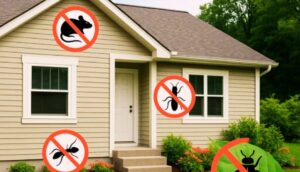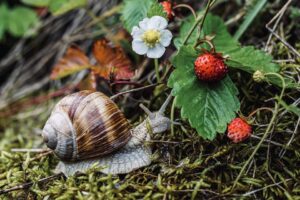How to Control Honey Bees

Honey bees are hard-working pollinators, these tiny engineers produce honey that’s enjoyed by millions of people worldwide, bee farms also produce honey on a mass scale which is profitable not only by the honey that is produced but by the employment of many. The natural habitat of honey bees includes meadows, woodlands, orchards, gardens, heathlands, grasslands, moorlands, logs rocky cliffs, large cavities or hollows, and other areas where flowering plants are abundant.
There are cases where honey bees have been reported to move by swarms into urban areas the reason for this is bees like other pollinators and insects seek out environments that they are attracted to or see as a haven for shelter, food, and water sources and a place to raise their young.
How to Identify Honey Bees
Honey bees can be identified by a barrel-shaped amber-brown colored body, they possess a striped abdomen with hair. The faces of honey bees are heart-shaped. Females carry pollen in tight balls on their hind legs.
Lifecycle of Honey Bees
The lifecycle of honey bees begins with an egg, followed by larvae, pupa, and the adult. The queen can lay up to 2,000 eggs each day through the spring but as the queen ages, the number of eggs they lays significantly decreases. They may also no longer be able to place the eggs closely together, resulting in a patchy comb. When the winter season arrives the queen forms a new colony by laying eggs within each cell inside a honeycomb. Fertilized eggs will hatch into female worker bees, while unfertilized eggs will become honey bee males or drones.
How to Control Honey Bees Naturally
Honey bees help to bring balance to the ecosystem through the process of pollination and producing honey, but what steps should you take if honey bees visit your gardens? The reason for this is to avoid being stung because a honey bee will sting when feels threatened. The sting of a honey bee is not only painful but the venom has been known to cause an allergic reaction in some persons. There are several ways to control bees naturally below is a list of methods that have proven to be effective.
Grow Plants that will Repel Bees
Bees have a strong sense of smell therefore use their strong sense of smell to your advantage by installing plants that will deter them from your yard. These plants should be installed around the perimeter of your yard to keep bees at bay.

- Basil
- Cloves
- Garlic
- Mint
- Lavender
- Basil
- Eucalyptus
- Germaniums
- Pennyroyal
Keep Foods and Soft Drinks Out of Sight
Bees are attracted to fruits and the sugars of soft drinks, when consuming sodas or other soft drinks, and foods outdoors make sure and keep cans covered or pour soft drinks into a cup with a lid. Fruits should be covered with a sanitary plate, foil, or plastic wrap. Discard empty soda cans and the cans and bottles of other soft drinks in the trash cans.
The Use of Essential Oils
The scent of essential oils will help to deter honey bees, the odor of essential oils creates the same scent that plants give off that bees hate. Diffusing these oils will keep Bees away. These oils are effective against bee control.

- Peppermint oil
- Cedarwood oil
- Peppermint oil
- Clove oil
- Cinnamon oil
- Eucalyptus oil
- Lavender oil
- Rosemary oil
- Citronella oil
- Tea tree oil
Using Citronella Candles
A common practice to keep bees, mosquitoes, and wasps at bay is citronella candles, the scent of citronella candles can only travel up to a certain distance, these candles can be purchased from food stores, hardware stores, garden centers, etc…
How to Use Cayenne Pepper
Cayenne pepper is strong and will have bees on the run, sprinkling cayenne pepper generously on the soil surfaces will deter native ground bees that burrow underground.
Sweet Fragrances Will Attract Honey Bees
Bees are attracted to sweet fragrances that produce the scent of sweet juice and flowers, if you are wearing perfumes, colognes, and sunscreen that carry these scents will attract hungry honey bees. If possible try to avoid using these scents.
Use Vinegar to Get Rid of Bees
Bees hate the smell of vinegar and will not hang around, this all-natural method is a great substitute for pesticides, simply mix two cups of vinegar with two cups of warm water. Pour this mixture into a plastic 32 oz spray bottle with a nozzle that can be adjusted for this solution to come out fine or misty. Next approach a single bee and being to spray the mixture, once the bee falls to the ground step on it with appropriately soled footwear. Once you have stepped on the bee make sure it’s dead. Then sweep up the bee into a dustpan and properly dispose of it.
Vinegar is a mild insecticide and you should not approach a be hive but instead call in the pest control professional who is trained in this field to deal with bee hives or contact a beekeeper who is also highly trained to deal with multiple bees or bee hives.
Seal off Holes
Any entry points around your home for example tears, cracks, gaps, or holes should be blocked or sealed, and tree stamps that are hollowed should be filled in or removed completely. These openings will encourage swarms of bees to start building a new nest. Once the nest is created the bees will begin to make honey that will attract bugs.
Colorful Clothing
Have you ever had a single bee flying around your head, it may be because you may be wearing colors that bees are attracted to. Bees are attracted to these colors in flowering plants, wearing colors of purple, blue, and violet will attract bees to you.
Garlic Spray Solution
I love the aroma and the flavors of garlic, this herb is used in many food recipes but bees on the other hand hate the scent of garlic and will stay clear, garlic powder can be sprinkled around your garden or to make a spray solution boil one garlic bulb in 500ml of water for about 10-12 minutes. Once boiled remove the garlic from the stove and let it cool, pour the water into a spray bottle and spray the areas you want to keep bee-free. The garlic scent will overpower the sweet smell of the other plants bees are attracted to. Garlic can be toxic to bees and bee larvae so as mentioned earlier spray the areas where bees are spotted to deter them, garlic spray solution can also be applied to plants that bees feed on to remove a colony’s food source.
Cinnamon Power
Cinnamon has a pleasant taste and aroma but like another natural method, the scent of cinnamon has a power that will chase away bees, this strong spice can pack a punch when it comes to bee control. Apply cinnamon powder to the outside of a bee’s nest or hive bees hate the cinnamon powder scent and after several days of applying bees will relocate or move away. Make sure when approaching a bee hive to wear protective clothing or better yet call in the professionals who are trained in bee control.
10 Frequently Asked Questions (FAQs)
1. Why are honey bees showing up around my home?
Honey bees are usually attracted to your yard because they’ve found a food source—like blooming flowers, sugary drinks, or even a sweet-smelling trash can. If they’re swarming, they may also be looking for a new place to nest. While they’re great pollinators, having too many bees close to your home can be a concern.
2. Are honey bees dangerous?
Generally, honey bees are gentle and won’t sting unless they feel threatened. However, if they build a hive near your home or get inside your walls, the risk of stings increases—especially for those who are allergic. It’s best to keep a respectful distance and avoid swatting at them.
3. Can I remove honey bees myself?
It’s not recommended. Removing honey bees can be tricky—and dangerous if you’re not trained. Bees can become aggressive when they sense a threat to their colony. It’s always best to call a local beekeeper or pest control pro who can safely relocate the hive without harming the bees.
4. What’s the difference between bee control and bee extermination?
Great question! Bee control usually means relocating the hive safely to protect the bees and reduce the risk to people. Bee extermination, on the other hand, involves killing the bees, which is not ideal—especially since honey bees are vital to our environment. Many pest control companies now work with beekeepers to ensure safe removal.
5. Why is it important to protect honey bees during removal?
Honey bees play a huge role in pollinating the food we eat. Without them, we’d have a serious decline in fruits, vegetables, and even coffee. That’s why humane bee control methods are preferred—they help solve your problem while keeping the bees alive and well.
6. How do I know if I have a honey bee hive on my property?
Look for bees flying in and out of a single spot regularly—like a wall void, tree trunk, or roof eave. You might also hear a faint buzzing sound inside walls or notice an increase in bee activity near your home. If you suspect a hive, don’t try to peek inside. Call a professional.
7. What should I do if bees are inside my house?
Stay calm and don’t swat at them—they’ll usually find their way out. Open a window or door if it’s safe to do so. If you’re dealing with several bees or they keep coming back, you may have a hive nearby or in your walls, and it’s time to call in an expert.
8. Can honey bees cause damage to my home?
Yes, they can. If they build a hive inside your walls, the honey and wax can melt and damage insulation, drywall, or wiring. Plus, once bees are removed, the leftover scent may attract new colonies unless the area is thoroughly cleaned and sealed.
9. How can I keep honey bees from coming back?
After a hive is removed, seal up any cracks, vents, or holes bees could use to get inside. Avoid leaving sweet food or drinks outside, and keep garbage tightly closed. You can also plant bee-repelling herbs like mint or eucalyptus around entryways for a natural deterrent.
10. Who should I call for safe honey bee removal?
Your best bet is a local beekeeper or pest control company that specializes in live bee removal. Many areas have services that will relocate the bees to a local apiary, keeping both your home and the environment safe.
Conclusion
Honey bees are one of nature’s wonders, these tiny engineers are hard-working and are beneficial to humans, pets, and plant life. Honey bees are considered a beneficial insect therefore we should do what we can to protect them by installing one or more of these methods that will deter and cause them to seek shelter, food, and water in their habitat. One or two may be taken down but the goal is to help preserve their lives. If you have a server bee issue or a bee swarm don’t try to take them on but rather seek help and call in the professionals who have been trained to control bee populations.










Hi, one thing I know for sure about these is that they have a very strong sense of smell. And that includes also for the things that they want especially. And when they smell it they can be extremely determined to get to it even with counter smells in the area. I think so if you had enough counter smells they would be deterred.
Yes bees do have a strong sense of smell, these tiny engineers are beneficial.
I found your article about honey bees informative. I did not know that Cayenne pepper can be used to repel honey bees. As I love cayenne pepper and have a lot of it around, I will most certainly use it if I should have a bee issue. I am wondering if Cayenne pepper can help repel carpenter bees, as I tend to get those from time to time. Thank you for a good read.
You can give it a try and see what happens it might work and I am so happy to help!
I must admit that when I came across your article I was prepared to scold you for telling others to mistreat the much-needed honeybee. Then I read your article and felt ashamed of myself for assuming the worst.
I applaud your recommendations for deterring honey bees. I do also understand that some people have allergies to bees and it is detrimental to their health to be ‘bee-free’.
You have provided very responsible and coexisting solutions to the summer bee epidemic. I will share this article with my friends who have this allergy. I am sure they are just as clueless as I was before reading your article on how to naturally and safely control honeybees from taking over your yard. My two favorite tips are the cayenne pepper and the vinegar.
Any advice for the person that is okay with honeybees, but not wasps and other such bee relatives? Are there any of the provided solutions that are most effective with the more aggressive bees? I don’t want to kill them even if they are not honeybees lol, but I also do not want to share my yard with wasps and yellow-jackets just because I allow the honeybee in.
Thank you so much for this article it was very insightful!
Stacie
Well, we should protect beneficial insects as much as we can, as for wasps I will soon be publishing an article on this topic. Well if you’re dealing with a hive or swarms of bees it’s best to call the professional and let them deal with aggressive bees which can be harmful.
Well, every insect plays a part in our ecosystem this biodiversity of insect species and plant life helps to bring balance. For example, the good bugs use the bad bugs as a food source. This too is also a part of the food chain known as biological control so while you may not want to harm the bad bugs the good bugs will naturally take care of them, again by using the bad bugs as a food source. Each group of insect species has a part to play in nature it’s a natural occurrence.
I am so happy to help and thanks so much for your kind words!